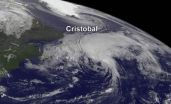(Press-News.org) Toronto, Canada – Older adults who stay active by volunteering are getting more out of it than just an altruistic feeling – they are receiving a health boost!
A new study, led by the Rotman Research Institute at Baycrest Health Sciences and published online this week in Psychological Bulletin, is the first to take a broad-brush look at all the available peer-reviewed evidence regarding the psychosocial health benefits of formal volunteering for older adults.
Lead investigator Dr. Nicole Anderson, together with scientists from Canadian and American academic centres, examined 73 studies published over the last 45 years involving adults aged 50-plus who were in formal volunteering roles.
To be included in the review, studies had to measure psychosocial, physical and/or cognitive outcomes associated with formal volunteering – such as happiness, physical health, depression, cognitive functioning, feelings of social support and life satisfaction.
"Our goal was to obtain a more comprehensive view of the current state of knowledge on the benefits of volunteering among older adults," said Dr. Anderson, a senior scientist with Baycrest's Rotman Research Institute and associate professor, University of Toronto. "We discovered a number of trends in the results that paint a compelling picture of volunteering as an important lifestyle component for maintaining health and wellbeing in later years."
Among the key findings:
Volunteering is associated with reductions in symptoms of depression, better overall health, fewer functional limitations, and greater longevity.
Health benefits may depend on a moderate level of volunteering. There appears to be a tipping point after which greater benefits no longer accrue. The "sweet spot" appears to be at about 100 annual hours, or 2-3 hours per week.
More vulnerable seniors (i.e. those with chronic health conditions) may benefit the most from volunteering.
Feeling appreciated or needed as a volunteer appears to amplify the relationship between volunteering and psychosocial wellbeing.
"Taken together, these results suggest that volunteering is associated with health improvements and increased physical activity – changes that one would expect to offer protection against a variety of health conditions," said Dr. Anderson. Indeed, a moderate amount of volunteering has been shown to be related to less hypertension and fewer hip fractures among seniors who volunteer compared to their matched non-volunteering peers.
One troubling finding for the research team was that "very few studies" have examined the benefits of volunteering on cognitive functioning in older adults. The report noted that "not a single study" has examined the association between volunteering and risk of dementia, or the association between volunteering and a host of other health conditions that put seniors at higher risk for dementia, such as diabetes and stroke.
With dementia prevalence projected to double over 20 years, from over 30 million people worldwide today to more than 65 million people in 2030 (Alzheimer's Disease International and World Health Organization, 2012), Dr. Anderson called it a "startling omission" that the field of neuroscience research has yet to investigate the capacity of volunteering to mitigate dementia risk or delay onset.
"We encourage investigators to include more objective measures of cognitive functioning in future studies. Particularly interesting would be the inclusion of a more comprehensive battery of neuropsychological tests, so that the association of volunteering with the risks of various forms of dementia and its precursor, mild cognitive impairment, could be ascertained," the report concluded.
INFORMATION:
Academic and medical centres collaborating on the systematic review with Baycrest/University of Toronto included the Centre d'excellence sur le Vieillissement de Québec, Centre de recherche du CHU de Québec and Laval University; Providence VA Medical Centre; University of California (San Francisco); University of Windsor; and York University. The study was funded by the Canadian Institutes of Health Research.
Dr. Anderson and her international research team, along with 33 older adult volunteers, comprise the "BRAVO" team (Baycrest Research About Volunteering in Older Adults). BRAVO has a second study in preparation for publication in the next few years that examines the psychosocial, physical and cognitive benefits associated with post-retirement volunteering. The team has been studying a group of adult volunteers, aged 50-plus, at Baycrest over the past five years.
For more information on this press release, please contact:
Kelly Connelly
Senior Media Officer
Baycrest Health Sciences
416-785-2432
kconnelly@baycrest.org
Evidence mounting that older adults who volunteer are happier, healthier
Health benefits appear to peak at 100 volunteer hours annually, or 2-3 hours per week
2014-08-29
ELSE PRESS RELEASES FROM THIS DATE:
NASA sees Hurricane Cristobal racing through North Atlantic
2014-08-29
Satellite imagery shows Hurricane Cristobal racing through the North Atlantic on Friday, August 29 while losing its tropical characteristics. An image from NOAA's GOES-East satellite showed Cristobal headed south of Greenland. The previous day, NASA's TRMM satellite saw heavy rainfall occurring in the hurricane.
In a visible image from NOAA's GOES-East satellite on August 29 at 7:45 a.m. EDT, Hurricane Cristobal was moving through the North Atlantic about 500 miles southwest of Greenland. The image was created by the NASA/NOAA GOES Project at NASA's Goddard Space Flight ...
CCNY team defines new biodiversity metric
2014-08-29
To understand how the repeated climatic shifts over the last 120,000 years may have influenced today's patterns of genetic diversity, a team of researchers led by City College of New York biologist Dr. Ana Carnaval developed a new biodiversity metric called "phylogeographic endemism."
It quantifies the degree to which the genetic variation within species is restricted in geographical space.
Dr. Carnaval, an assistant professor of biology, and 14 other researchers from institutions in Brazil, Australia and the United States, analyzed the effects of current and past climatic ...
Hydrogen powers important nitrogen-transforming bacteria
2014-08-29
This news release is available in German. Nitrite-oxidizing bacteria are key players in the natural nitrogen cycle on Earth and in biological wastewater treatment plants. For decades, these specialist bacteria were thought to depend on nitrite as their source of energy. An international team of scientists led by Holger Daims, a microbiologist at the University of Vienna, has now shown that nitrite-oxidizing bacteria can use hydrogen as an alternative source of energy. The oxidation of hydrogen with oxygen enables their growth independent of nitrite and a lifestyle outside ...
NASA animation shows Hurricane Marie winding down
2014-08-29
VIDEO:
This video of NOAA's GOES-West satellite imagery from Aug. 26-29 shows Hurricane Marie winding down into a post-tropical storm.
Click here for more information.
NOAA's GOES-West satellite keeps a continuous eye on the Eastern Pacific and has been covering Hurricane Marie since birth. NASA's GOES Project uses NOAA data and creates animations and did so to show the end of Hurricane Marie.
At 5 a.m. EDT (0900 UTC) on Friday, August 29, Marie became a post-tropical storm ...
'Face time' for the heart diagnoses cardiac disease
2014-08-29
To the careful observer, a person's face has long provided insight into what is going on beneath the surface. Now, with the assistance of a web camera and software algorithms, the face can also reveal whether or not an individual is experiencing atrial fibrillation, a treatable but potentially dangerous heart condition.
A pilot project, the results of which were published online today in the journal Heart Rhythm, demonstrates that subtle changes in skin color can be used to detect the uneven blood flow caused by atrial fibrillation. The technology was developed in a ...
Not all phytoplankton in the ocean need to take their vitamins
2014-08-29
Some species of marine phytoplankton, such as the prolific bloomer Emiliania huxleyi, can grow without consuming vitamin B1 (thiamine), researchers have discovered. The finding contradicts the common view that E. huxleyi and many other eukaryotic microbes depend on scarce supplies of thiamine in the ocean to survive.
"It's a really different way to think about the ocean," says CIFAR Senior Fellow Alexandra Worden, co-author on The ISME Journal paper with CIFAR fellows John Archibald (Dalhousie University), Adrián Reyes-Prieto (University of New Brunswick) and three lead ...
Ready for mating at the right time
2014-08-29
This news release is available in German. The exchange of chemical signals between organisms is considered the oldest form of communication. Acting as messenger molecules, pheromones regulate social interactions between conspecifics, for example, the sexual attraction between males and females. Fish rely on pheromones to trigger social responses and to coordinate reproductive behavior in males and females. Scientists at the Marine Science Center at the University of the Algarve in Faro, Portugal, and at the Max Planck Institute for Chemical Ecology in Jena, Germany, ...
China's reform of R&D budget management doesn't go far enough
2014-08-29
In almost 20 years, China's R&D expenditure as a percentage of its gross domestic product has more than tripled, reaching 1.98 per cent in 2012. This figure surpasses the 28 member states of the EU, which collectively managed 1.96 per cent.
However, despite this, China saw a sharp decline in money spent on scientific research, in particular applied research. Basic research funding plummeted from 5.2 per cent in 1995 to 4.7 per cent in 2011, and applied research funding fell from 26.4 per cent to 11.8 per cent in the same years.
This is Dr Cao's second Science article ...
Snails tell of the rise and fall of the Tibetan Plateau
2014-08-29
Boulder, Colo., USA - The rise of the Tibetan plateau -- the largest topographic anomaly above sea level on Earth -- is important for both its profound effect on climate and its reflection of continental dynamics. In this study published in GSA Bulletin, Katharine Huntington and colleagues employ a cutting-edge geochemical tool -- "clumped" isotope thermometry -- using modern and fossil snail shells to investigate the uplift history of the Zhada basin in southwestern Tibet.
Views range widely on the timing of surface uplift of the Tibetan Plateau to its current high ...
Science advice to governments comes of age at Auckland conference
2014-08-29
Auckland, New Zealand (29 August) — Science advice to governments has emerged as a discipline in its own right, which is both art and science. This is what delegates to the world's first summit of science advice heard at a meeting in Auckland, which closed today with a strong call to strengthen international collaboration, an agreement to formalise the network and meet again in 2016.
Convened by the International Council for Science (ICSU) and hosted by New Zealand's Chief Science Advisor, Sir Peter Gluckman, this historic summit marks a turning point in the global awareness ...
LAST 30 PRESS RELEASES:
Boys are more motivated, while girls are more compassionate?
Study identifies opposing roles for IL6 and IL6R in long-term mortality
AI accurately spots medical disorder from privacy-conscious hand images
Transient Pauli blocking for broadband ultrafast optical switching
Political polarization can spur CO2 emissions, stymie climate action
Researchers develop new strategy for improving inverted perovskite solar cells
Yes! The role of YAP and CTGF as potential therapeutic targets for preventing severe liver disease
Pancreatic cancer may begin hiding from the immune system earlier than we thought
Robotic wing inspired by nature delivers leap in underwater stability
A clinical reveals that aniridia causes a progressive loss of corneal sensitivity
Fossil amber reveals the secret lives of Cretaceous ants
Predicting extreme rainfall through novel spatial modeling
The Lancet: First-ever in-utero stem cell therapy for fetal spina bifida repair is safe, study finds
Nanoplastics can interact with Salmonella to affect food safety, study shows
Eric Moore, M.D., elected to Mayo Clinic Board of Trustees
NYU named “research powerhouse” in new analysis
New polymer materials may offer breakthrough solution for hard-to-remove PFAS in water
Biochar can either curb or boost greenhouse gas emissions depending on soil conditions, new study finds
Nanobiochar emerges as a next generation solution for cleaner water, healthier soils, and resilient ecosystems
Study finds more parents saying ‘No’ to vitamin K, putting babies’ brains at risk
Scientists develop new gut health measure that tracks disease
Rice gene discovery could cut fertiliser use while protecting yields
Jumping ‘DNA parasites’ linked to early stages of tumour formation
Ultra-sensitive CAR T cells provide potential strategy to treat solid tumors
Early Neanderthal-Human interbreeding was strongly sex biased
North American bird declines are widespread and accelerating in agricultural hotspots
Researchers recommend strategies for improved genetic privacy legislation
How birds achieve sweet success
More sensitive cell therapy may be a HIT against solid cancers
Scientists map how aging reshapes cells across the entire mammalian body
[Press-News.org] Evidence mounting that older adults who volunteer are happier, healthierHealth benefits appear to peak at 100 volunteer hours annually, or 2-3 hours per week




